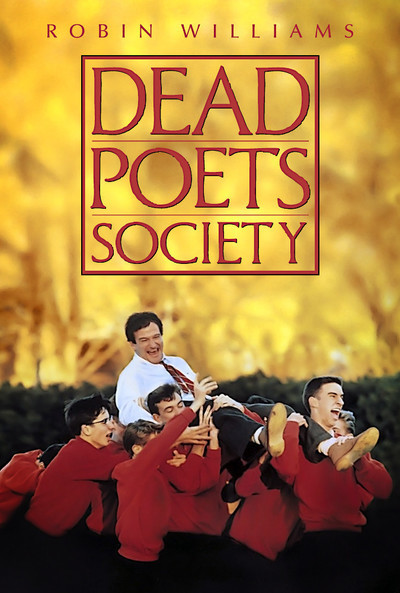Last year, the world was rocked by the sudden, tragic death of Robin Williams, who many consider to be THE funny man of our times. Who would have guessed how he was really feeling all this time? It's another tragic reminder that you can't judge an actor by their characters (RIP Mr. Williams. Your loss will be felt by all. I kind of relate to you myself.)
I myself have often been impressed with how much talent he had. He was a hilarious comedian, and his movie roles could be funny, whimsical, deadly serious, and even a little scary sometimes. One of his most iconic movies is Dead Poets Society, which I briefly talked about in another post. And I can't talk about this movie without saying "Carpe Diem" at some point, so I'll just say it now. There it is.
So what does this movie have to do with spirituality? Well, uh, Carpe Diem is like Latin, I think, and, uh, Jesus was Latin, I think, and, uh, stuff...okay, I'm just kidding. Let's start over.
I am going the Christ figure route once more. Robin Williams plays John Keating, a new teacher at a boarding school known for its sense of tradition and conformity. Most of the teachers subscribe to these philosophies and prove to teach very boring classes. However, Mr. Keating takes a different approach to his teaching style. (Once again, the whole "in the place, but not of it" principle). He takes his class out in the hall and teaches them the lesson that makes up the crux of the film, which is to "seize the day" and "make your lives extraordinary." (Could that include making them "fishers of men?" Yeah, I'm really reaching here. Don't worry. I'll get to the good stuff soon.)
Mr. Keating slowly but surely changes the way these boys think of themselves and their lives. First, he tells them about a club he was once part of called the Dead Poets Society where they met in a secret cave and let poetry sink in in a way they couldn't in a classroom. So, the boys decide to bring back the club and follow his example. They've become his disciples, if you will.
He manages to connect with and help some of the boys on an individual basis. He helps the shy new boy, Todd Anderson, find the poetic extrovert within himself. He encourages the boys' leader, Neil Perry, to pursue his dreams of acting, rather than giving into his father's dreams for his life. Mr. Keating wasn't directly involved in this one, but it was his influence that prompted Knox Overstreet to take a risk on calling the girl he liked.
At one point in the movie, the most reckless boy in the bunch, Charlie Dalton, takes a foolish risk to try to promote his ideas for the school and is nearly expelled. Keating reprimands him for this and tells him a wise man knows when to be cautious, kind of the same way Jesus told Peter to put away his sword in the garden of Gethsemane.
Unfortunately, a lot of people aren't in agreement with his philosophies, particularly Mr. Nolan, the headmaster. He believes in teaching the boys to conform, rather than think for themselves. So, he gets after Keating much the way the religious leaders did to Jesus. Charlie Dalton's stunt just makes the administration all the more suspicious of Keating. But, he always seems to have an answer for their complaints and continues on.
But, there are some people he can't handle. Neil Perry's father is none too happy that Neil defied his wishes and performed in the play. As a result, he pulls Neil out of the school and tells him he will send him to military school. Feeling defeated from being forbidden to follow his dreams and frustrated by his inability to talk to his dad about them, he commits suicide (a similar fate to one of the disciples).
The administration now needs a scapegoat for the incident because prestigious schools have been ruined because of things like this. Their chosen target, of course, is John Keating. (Forced to take the blame for something that wasn't his fault, when he was just trying to help. Sound familiar?) It is then that we see our Judas Iscariot in the story, Richard Cameron. Cameron goes to the administrator and tells them everything about Keating and the dead poets society, and wholeheartedly cooperates with their plan to "crucify" Keating. The other boys still want to remain loyal to Keating because of how much he's touched them, but they all do end up caving and signing the paper blaming Keating, much the way the disciples all ran and abandoned Jesus in his hour of need.
But the story ends with a feeling of hope. Even though, the boys were all forced to give in, they still manage to let Mr. Keating know that they stand with him by defying the headmaster and standing on their desks and chanting "Oh Captain, my Captain." I know I've shared this scene before, but it's so awesome, I have to do it again.
And I think it's significant that it was Todd Anderson who stood first. Even though they had basically been forced to sign Keating's termination papers, they still decided to stand up for what they believe in in the end. It's a choice we all must make sooner or later. Even if we do make mistakes, it's never too late to do the right thing. Will you?
So, maybe not the best parallel to the Gospel I've seen, but it's something...

No comments:
Post a Comment